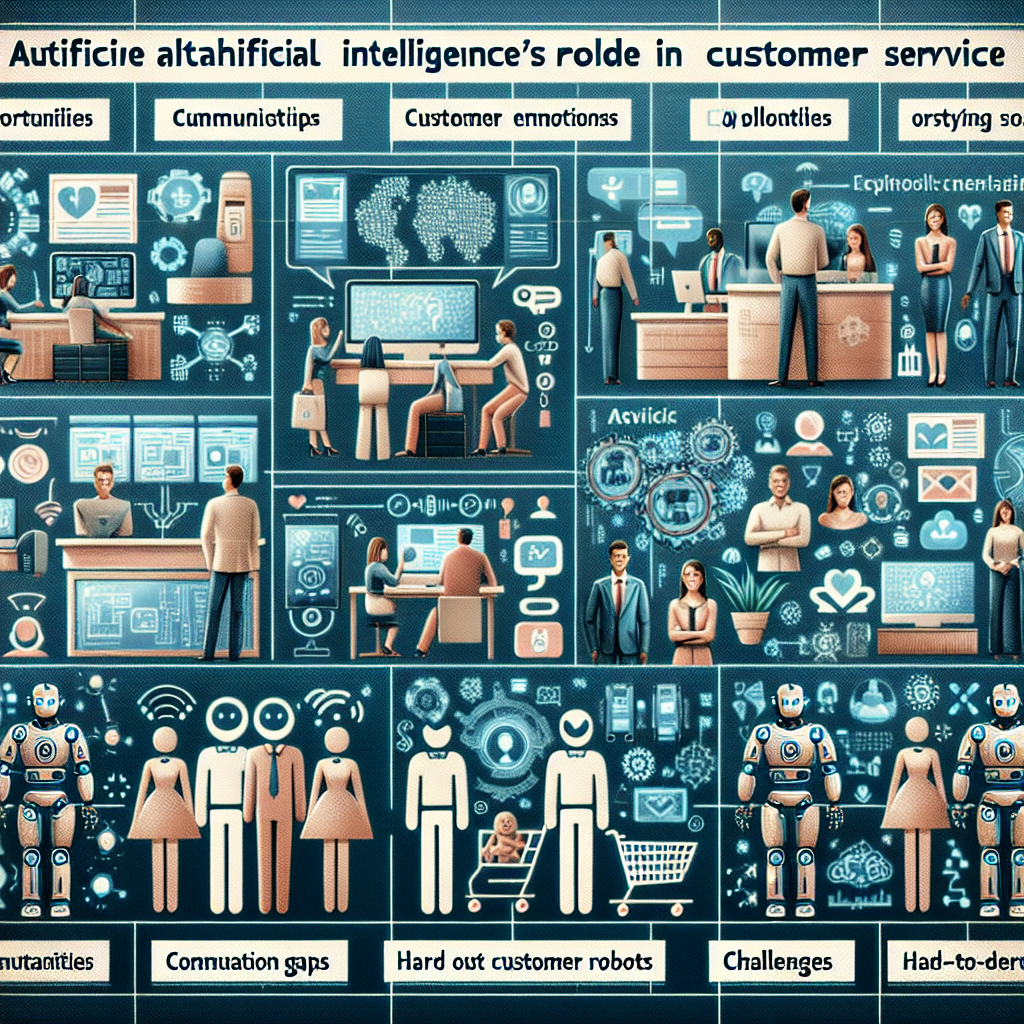In recent years, artificial intelligence (AI) has made significant strides in transforming various industries, including customer service. AI technologies such as chatbots, virtual assistants, and machine learning algorithms have revolutionized the way businesses interact with their customers, providing faster, more personalized, and efficient service. As AI continues to advance, the future of customer service is poised to be even more AI-driven. In this article, we will explore the opportunities and challenges that the future of AI in customer service presents.
Opportunities:
1. Improved customer experience: AI-powered tools such as chatbots can provide immediate responses to customer queries, leading to faster resolution of issues and increased customer satisfaction. Virtual assistants can also offer personalized recommendations and suggestions based on a customer’s past interactions, preferences, and purchase history.
2. Cost savings: AI can help businesses reduce operational costs by automating routine tasks, such as answering frequently asked questions, processing orders, and handling simple customer inquiries. This allows human agents to focus on more complex and high-value interactions, ultimately improving efficiency and productivity.
3. 24/7 support: AI-powered chatbots and virtual assistants can provide round-the-clock customer support, ensuring that customers can get assistance at any time, regardless of their location or time zone. This can lead to increased customer loyalty and retention, as well as a competitive advantage for businesses.
4. Data-driven insights: AI can analyze large volumes of customer data to identify trends, patterns, and preferences, enabling businesses to make more informed decisions and improve their products and services. By leveraging AI-driven analytics, businesses can better understand their customers’ needs and behavior, leading to more targeted and effective marketing campaigns.
5. Scalability: AI-powered customer service solutions can easily scale to handle a high volume of customer inquiries and interactions, without the need for additional human agents. This allows businesses to meet growing customer demands and fluctuations in traffic, while maintaining consistent service quality and responsiveness.
Challenges:
1. Lack of human touch: While AI can provide quick and efficient customer service, it may lack the empathy and emotional intelligence that human agents can offer. Customers may feel frustrated or misunderstood when interacting with AI-powered tools, leading to a negative perception of the brand and a decline in customer satisfaction.
2. Data privacy and security concerns: AI relies on collecting and analyzing vast amounts of customer data to provide personalized service and recommendations. This raises concerns about data privacy and security, as businesses must ensure that customer information is protected and used responsibly. Failure to do so can result in trust issues and potential regulatory fines.
3. Integration with existing systems: Implementing AI-powered customer service solutions requires integration with existing systems, such as CRM platforms, ticketing systems, and communication channels. Ensuring seamless integration and interoperability can be challenging, especially for businesses with complex IT infrastructures and legacy systems.
4. Training and expertise: Developing and deploying AI-powered customer service solutions requires specialized skills and expertise in AI technologies, machine learning, natural language processing, and data analytics. Businesses may face challenges in recruiting and training employees with the necessary knowledge and experience to effectively implement and manage AI initiatives.
5. Unforeseen technical issues: AI-powered tools are not immune to technical glitches, bugs, and errors, which can disrupt customer interactions and lead to frustration and dissatisfaction. Businesses must invest in robust testing, monitoring, and maintenance processes to identify and resolve technical issues proactively, ensuring a seamless customer experience.
FAQs:
1. What is the role of AI in customer service?
AI plays a crucial role in customer service by automating routine tasks, providing personalized recommendations, and analyzing customer data to improve service quality and efficiency. AI-powered tools such as chatbots, virtual assistants, and predictive analytics enable businesses to deliver faster, more responsive, and personalized customer support.
2. How can AI improve the customer experience?
AI can improve the customer experience by providing immediate responses to customer inquiries, offering personalized recommendations and suggestions, and analyzing customer data to identify trends and preferences. By leveraging AI-driven tools, businesses can enhance customer satisfaction, loyalty, and retention, leading to a competitive advantage in the marketplace.
3. What are the challenges of implementing AI in customer service?
Some of the challenges of implementing AI in customer service include the lack of human touch and empathy, data privacy and security concerns, integration with existing systems, training and expertise requirements, and unforeseen technical issues. Businesses must address these challenges proactively to ensure the successful deployment and adoption of AI-powered customer service solutions.
4. How can businesses address the challenges of AI in customer service?
To address the challenges of AI in customer service, businesses can focus on enhancing the human-machine interaction, implementing robust data privacy and security measures, ensuring seamless integration with existing systems, investing in training and upskilling employees, and establishing proactive monitoring and maintenance processes. By addressing these challenges effectively, businesses can maximize the benefits of AI in customer service and deliver a superior customer experience.
In conclusion, the future of AI in customer service presents numerous opportunities for businesses to improve customer experience, drive cost savings, and gain a competitive edge. However, businesses must also navigate various challenges, including the lack of human touch, data privacy concerns, integration issues, training requirements, and technical issues. By addressing these challenges proactively and leveraging AI technologies effectively, businesses can harness the full potential of AI in customer service and deliver superior customer support and satisfaction.

